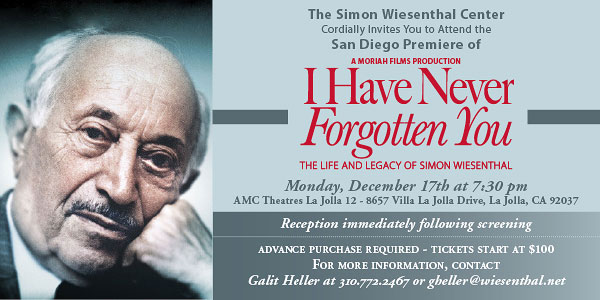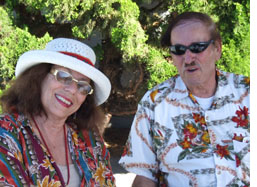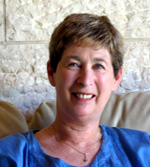| |
|


SAN DIEGO JEWISH BOOK FAIR
Two centuries of U.S.-Muslim conflict dissected by author Michael B. Oren
Power, Faith and Fantasy: America in the Middle East: 1776 to the Presentby Michael B. Oren, published by Norton, 672 pages, $35
By Joel Moskowitz, MD and Arlene Moskowitz, JD
 LA JOLLA, California—Our leaders were contemplating the international situation which threatened our very existence. Muslim forces were dedicated to capturing our assets, killing our citizens and even making slaves of many. Some in our administration advocated we bribe our foes to get them to desist. Others insisted that we fight whatever the cost. LA JOLLA, California—Our leaders were contemplating the international situation which threatened our very existence. Muslim forces were dedicated to capturing our assets, killing our citizens and even making slaves of many. Some in our administration advocated we bribe our foes to get them to desist. Others insisted that we fight whatever the cost.
Author Michael B. Oren recalled to attendees of the San Diego Jewish book Fair that this was the situation our infant nation faced in the first years of our independence! As he
Arlene and Joel Moskowitz
reminded his listeners on Saturday evening, Nov. 10,, the strains of the Marine hymn filled the minds of many: “From the halls of Montezuma to the shores of Tripoli, we will fight our countries battles on the land and on the sea….” “Not one penny for tribute” advocated Thomas Jefferson. Disputing this was John Adams, our second president, who was in favor of appeasing our foe. Sounds like debates we now read about every day.
Would we be surprised, revealed Oren, that the original lyrics of The Star Spangled Banner made reference to “humble Muslims bowing down” or that a tentative model of the Statue of Liberty was of a veiled Muslim female! We have a 230- year history of turbulent interaction with the Muslim world. William Tecumseh Sherman, Civil War general, proposed, circa 1860, that we export democracy and patriotism to the illiterate in Egypt.
The sentiments of our founding fathers and mothers were that they were the ‘new Israelites” having escaped the tyranny of the “Pharaoh” of England. This attitude morphed into a Protestant urge to be missionaries in the Holy Land where the resident Jews would be converted with less sympathy for the Muslims. Their agrarian hopes for the peoples of the book were unsuccessful but this early Zionism was espoused by ardent Christians of America. Oren's Power, Faith and Politics is the history of the unsteady course of relationships between our country and the Muslims of the Middle East from 1776 to present times. The similarities in this jagged relationship, marauding Muslims of Tripoli back then and Libya and Al Qaeda and other terrorist Muslim factions today, he suggested, is a testimony to the cyclical nature of history.
Romantic tales of the Middle East lace our concepts of these exotic cultures. Who has not admired Sinbad the Sailor and Aladdin? Caution! Didn’t the latterhave to deal with the “Forty Thieves?" Rudolph Valentino in The Sheik charmed and thrilled early movie goers. It was common for celebrities such as Mark Twain to visit the Orient. Think Innocents Abroad: He didn’t like those people and their ways.
The relationship between Western civilizations and the forces in the Middle East was not a straight line of conflict. An example is the alliance of the Ottoman Turks with British and French versus Russia in the Crimean War. Some might argue that the Ottoman Turks were not the characters we now know in that former empire.
Modern technology has, however, accelerated the dangers we face. Specifically is the question how and when to deal with Iranian intentions to build a plutonium bomb. After consulting with his contacts in the Mossad and Israeli intelligence, he is persuaded that Iran will have a ‘hot’ reactor in 2008 and a fully operational nuclear weapon by 2009.
Delay in forceful attempts to eradicate this threat may result in a Chernobyl-style spread radiation if there is a subsequent strike on Iran’s nuclear plants. Our government’s intelligence has a longer time line (Iran will be ‘hot’ by 2009 and not have a ‘viable’ (another oxymoron) bomb until maybe 2010 or even 2011).
It is easy to believe that Oren, a historian and former IDF parachutist, knows what he is talking about. When he expresses doubts about the wisdom of Israel's Prime Minister Ehud Olmert’s willingness to make concessions, one must feel concern. Oren pointed out that former Prime Minister Ariel Sharon required 50,000 troops to move 8,100 settlers out of “Palestinian territories." What realistically would it take to remove many more Israelis from the West Bank which Olmert hopes will placate the arabs of that area? Do you hear the strains of the Marine Hymn?
History offers amazing parallels. In 1844, a distinguished professor of Hebrew at New York University” wrote a book The Valley of Vision; or, the Dry Bones of Israel Revived. It called for creation of a Jewish state in Palestine so they would he a light among the nations, a link between man and G-d. The author, George Bush, is a direct ancestor of the 41st and 43rd Presidents of the United States?

Scholars-in-residence
program
Presentations are free; kosher meals moderately priced
● Rabbi
Motti Berger, founder of "Jews for Judaism," Nov. 16-17
● Rabbi
Yakov Horowitz, founder, Project Y.E.S. (Youth Enrichment Services)
for
Agudath Israel, Jan. 4-5
● Rabbi Ari
Kahn, director, Foreign Student Programs,
Bar Ilan University, Israel, Feb.
22-23
Call us for details at (619)
287-9890
|


THE VIEW FROM JINSA
Parsing Secretary Rice's Mideast outlook
By Shoshana Bryen
WASHINGTON, D.C.—Secretary of State Rice spoke before the General Assembly of the United Jewish Communities this week in Nashville. She was eloquent about the contributions of the American Jewish community to our country, to charity and to faith. Then she turned to Israel and the Middle East and, while on the one hand, clearly inspired by Israel, she missed the essential nature of the conflict.
Whenever I visit Israel I am reminded of the awesome living achievement that is the Jewish state. I look out upon a nation that has made the desert bloom. I think of how a people with ancient traditions have built a prosperous, modern democracy, and how inspiring that could be for the rest of the Middle East. I see on the side of the road the aging shells of Israeli tanks and I think of the long line of Israeli patriots who gave their lives so that Israel could survive. But most of all, ladies and gentlemen, whenever I visit Israel, I am reminded of how precious the idea of Israel is and how essential it is to defend it.
Lovely, but:
Just think back to 2001. Despite the extraordinary efforts of the Clinton Administration, peace negotiations had collapsed. The violence between Palestinians and Israelis was almost daily. Israelis feared that every bus ride, every night out, could be another Passover massacre. The underlying factors that had made peace elusive since 1967 were nearly unchanged in 2001: Israel occupied the future Palestine and the Palestinian leadership was complicit in terror.
No, Madame Secretary. The problem was not that Israel "occupied the future Palestine." Israel had already turned over the outline of a future state to the Palestinian Authority under the Oslo Accords and had already been rewarded with unbridled hatred spewing from official Palestinian media, with terrorism, with the ruination by Palestinian education of their own children to provide fodder for killing Jews. The PA leadership was not "complicit" in other people's terrorism - it was the sole-source manufacturer.
The problem was, and remains that the Palestinians and most Arab states were never reconciled to the existence of Jewish sovereignty. There was terrorism against Israel long before and continuing after the defensive 1967 war in which Israel found itself in possession of the unallocated part of the British Mandate that had been used as a launching pad for violence against Jews. If you don't understand where the violence comes from, you cannot presume to set a path to a future without it.
Just consider, most Israelis now believe that a responsible Palestinian state is in the national interest of Israel and that true security will require an end to the occupation that began in 1967. Most Palestinians now believe that Israel will always be their neighbor and that no Palestinian state is going to be born through violence.
Again, a problem - Israelis may believe the occupation began in 1967; could you provide some evidence that the Palestinian leadership is not referring to the occupation they invariably say began in 1948?
Failure is simply not an option.
Yes, it is actually - it always is
We read in Proverbs: Where there is no vision, the people perish. And that, ladies and gentlemen, is my fear that if Palestinian reformists cannot deliver on their people's hope of an independent state, then the moderate center could collapse and the next generation of Palestinians could become lost souls of unbridled extremism.
Our fear, Madame Secretary, is that there simply is no "moderate center" among Palestinians. Our fear is that the current generation of Palestinians is lost after 14 years of being drenched in the "unbridled extremism" and blood lust of both Fatah and Hamas. Our fear is that the next generation of Israeli Jews will become the souls lost to unbridled Palestinian extremism.
Bryen is the director of special projects for the Jewish Institute for National Security Affairs (JINSA)
< BACK TO TOP


A HERALD IN ZION
The joy of wintering on Israel's Riviera
Editor's Note: The weather has been clear and beautiful throughout Israel the last few days, but with the approach of winter, columnist Dorothea Shefer-Vanson looks back on a getaway to Eilat
By Dorothea Shefer-Vanson
 EILAT, Israel—Spending a few days in Eilat in winter is almost like going to another country. Day after day the sun shines out of a cobalt sky and the sea sparkles while storms rage in the rest of Israel. EILAT, Israel—Spending a few days in Eilat in winter is almost like going to another country. Day after day the sun shines out of a cobalt sky and the sea sparkles while storms rage in the rest of Israel.
From the hotel window one looks out over a glassy sea against the backdrop of the mountains of Jordan and Saudi Arabia, where all seems peaceful and serene. Boats skim the surface, a few brave souls brave the chilly water and palm-trees sway in the breeze.
Dorothea Shefer-Vanson
Meanwhile the weather reports from the north of the country speak of icy temperatures, flooded roads and gale-force winds. The feeling is surreal. The dissonance is heightened when one hears that some schoolboys have come from Manchester to learn skiing in the Golan Heights. All this in a country that is but a fraction of the size of England.
The tourist trade has picked up, and English and French tourists can be seen and heard in the hotel dining room and around the swimming pool. New hotels are being built and old ones renovated. Eilat is enjoying a revival of the tourist boom of previous years. The town boasts some really splendid hotels where the object seems to be to delight and pamper guests to the highest degree.
The drive back through the Negev reveals an unusual sight. The arid hills are covered with a green fuzz of grass and patches of wild flowers. Although all too transient, they are a rare delight.
Instead of driving straight home, I make straight for my daughter’s house in Zikhron Ya’akov, where my baby-sitting services are required. There, the cold and rainy weather keeps me confined to the house for a week while the Mediterranean Sea pounds the coast below.
< BACK TO TOP


WAR AND LORE
Two myths will color Annapolis confab: "occupation" and "illegal settlements"
By Isaac Yetiv, Ph.D
 LA JOLLA, California— The planned Middle-East "peace" conference in Annapolis, as many such attempts in the past, is predicated on American promises to the Arabs that Israel will put an end to its "occupation" and dismantle its "settlements." These two concepts have been used and abused to the detriment of Israel. Let me set the record straight: LA JOLLA, California— The planned Middle-East "peace" conference in Annapolis, as many such attempts in the past, is predicated on American promises to the Arabs that Israel will put an end to its "occupation" and dismantle its "settlements." These two concepts have been used and abused to the detriment of Israel. Let me set the record straight:
A recent poll showed a majority of the French people believed there was a Palestinian state which Israel had conquered in 1967 and "occupied" since. The French are certainly no exception. This widely-held misconception is a vivid testimony to the efficacy of Arab propaganda and to the failure of
Israel to counter it. The truth is that there has never existed in history a
Isaac Yetiv
sovereign Arab-Palestinian state; hence ,no "occupation" could have occurred. Even former Secretary of State James Baker, not known for his sympathy to the Jewish state, when asked in 1998 by an Egyptian journalist if the "territories" were "occupied", responded in the negative: " They are clearlydisputed territories;" he said, "that's what UN resolutions 242 and 338 are about." This distinction is not academic; it cuts through the heart of this seemingly intractable problem. The word "occupation," with its loaded geo-political connotations and moral implications, has become the rallying cry of the Palestinians, inflaming their passions and inciting them to violence, thus
rendering an already difficult situation practically unmanageable.
It is enough to remember that the "territories" of the West Bank and Gaza were taken by force, by Jordan and Egypt respectively, in a war of aggression against new-born Israel in 1948. Later,
Jordan annexed the West Bank, making its inhabitants Jordanian citizens (the term "Palestinian" was not current then). In 1967, Jordan joined Egypt and Syria in another war of aggression, lost the war and the West Bank to Israel.
Even a status quo ante in the framework of the peace treaty between Israel and Jordan would have returned the territories to Jordan, not to a new "entity", but the decision of King Hussein to "wash his hands from the Palestinians" kept Israel in control of these territories.
Another important fact, practically unknown, is that, since Oslo, 98 percent of the Arab population in the territories are governed by the Palestinian Authority, not by Israel. Another bone of contention, usually accompanying "occupation," is the question of Jewish settlements. Some call
them "illegal;" some say they are "an obstacle to peace;" but there is not one international legal document that supports either of these opinions. On the contrary: In 1920, the San Remo
International Conference "recognized the historical connection of the Jewish people to Palestine...", found "grounds for reconstituting their national home" and "encouraged close settlement of the land," which then meant all of Palestine, including today's Jordan.
Even the Oslo agreements did not call for the dismantlement , or even a "freeze" of Jewish settlements; on the contrary , they stipulate the right and obligation of Israel to defend them . In 1967, UN resolution 242 called for Israel to withdraw from "territories" [ not the territories] to "secure and recognized boundaries," to be arrived at "through negotiations." In 1993, Israel initiated
these "negotiations" with the Oslo agreement in order to put an end to the "occupation," which
culminated in the far-reaching Clinton-Barak peace offer of Palestinian statehood which is not even
mentioned in the Oslo accord.
A parallel line of violence closely followed the diplomatic itinerary and defeated it by stubborn design. For about a century now, a persistent rejectionist attitude by the Arab rulers has thwarted all
attempts at reconciliation and , in the process, sacrificed their Palestinian brethren . The rejection by the Arabs of the 1947 UN resolution 181 establishing a Jewish state and a Palestinian state, which Israel accepted, was followed by a disastrous war in 1948 that gave more territory to Israel ; they
again attacked in 1967 and lost more territory; even the surprise attack on Yom Kippur 1973 ended in failure; and the rejection of Camp David offer in 2000 was followed by the bloody war of terror.
As early as 1970, Stephen Schwebel, former head of the International Court of Justice, wrote in the American Journal of International Law: " As between Israel, acting defensively in 1948 and in
1967, on the one hand, and her Arab neighbors acting aggressively on the other, Israel has better title to the territory of what was Palestine, including the whole of Jerusalem, than do Jordan or Egypt."
In the light of these legal and moral premises, one may be tempted to conclude , as some indeed do, that Israel should hold on to the conquered territories, but my conclusion is different: While the present situation is certainly the fault of the Arab autocrats and the Palestinians who followed them, it isin Israel's interest, mainly for demographic reasons, to ardently pursue a resolution of the conflict that will , as the Arabic saying goes, "feed the hungry wolf and keep the shepherd alive." But the crux of the matter is that the Palestinians have repeatedly rejected all offers of peace, even the Clinton-Barak one that gave them all that they wanted, because they believe that they can get a better deal , not a two-state solution, but only one state, Palestine. And Israel refuses to commit suicide. This is why Annapolis, like Oslo, Madrid, Camp David,and Taba, is doomed to failure, and
Hamas, Hizballah and others will celebrate the day with more terror, bloodshed, and a possible conquest of the West Bank.
. < BACK TO TOP


PEOPLE OF THE BOOKS
Fictional rabbi become a detective— as if her life wasn't already crazy enough
Chanukah Guilt by Rabbi Ilene Schneider, Swimming Kangaroo Books, Arlington, TX
ISBN 978-1-934041-31-4, 2007, 314 pages, $16.99.
By Fred Reiss, Ed.D
 WINCHESTER, California—What, a rabbi with a family more dysfunctional than her congregation? This is definitely a fiction story. WINCHESTER, California—What, a rabbi with a family more dysfunctional than her congregation? This is definitely a fiction story.
Meet bird watcher Aviva Cohen. She is a twice divorced, mid-50-year-old rabbi who gave up a cushy job as an assistant rabbi in a large suburban Philadelphia synagogue for a pulpit in a small congregation located in the fictional southern New Jersey town of Walford, located somewhere near the real upscale communities of Cherry Hill, Moorestown, and Medford.
Rabbi Cohen leads a crazy life. In addition to her rabbinic duties, she must cope with her much older sister’s constant complaining about their mother’s
Fred Reiss
unwillingness to move from Boston to Florida, and her daughter, Trudy’s, lesbian relationship with Sherry. Trudy and Sherry share supervision for Sherry’s son, Josh, who suffers from ADHD, Asperger’s syndrome, hyperlexia, PDD, “and who knows what else.” Her life is further complicated when one of her ex-husbands, lawyer Steve Goldfarb, comes back into her life with his recent appointment to the position of temporary Director of Public Safety of Walford.
Rabbi Cohen’s adventure begins the week before Chanukah, which happens to fall early that year (the night of November 29th). The Phillips family asks her to officiate at the funeral of the elderly “self-made millionaire, builder, and land rapist,” William Phillips, a man she never met, and whose only possible connection to her is the fact that he donated the land on which her synagogue stands. She discovers that he is despised by everyone she consults, including her rabbinical colleagues, and his ex-wives.
The day following the funeral, Madison Phillips, one of William’s daughters, reveals to the rabbi that he did not die of a heart attack, but rather, she is the cause of her father’s death. She alludes to her involvement in a robbery at the order of an undisclosed party and a subsequent attempt to extort money from her father. Madison is too scared to reveal more and leaves in a dreadful state. The next day, before the rabbi is able to follow up, Madison is found dead, and the local police rule the death a suicide.
Rabbi Aviva narrates a first person account of how she reinvents herself as a detective (could the reason be the rumored malpractice suit against her by the Phillips family over Madison’s death), and how she spends the eight days of Chanukah sleuthing around Madison’s college, interviewing her Wiccan friends, and reviewing closed circuit video tapes in order to convince the police that the two deaths are actually murders. In the process she becomes a target herself. Though there is evidence that supports many possible suspects, the true perpetrator is made known in a surprise ending.
In Chankkah Guilt, Schneider succeeds in blending the complex life of a congregational spiritual leader with that of first-rate detective, family member, confidant, friend, human being and even yenta (nosy body).
< BACK TO TOP


SAN DIEGO JEWISH WORLD
THE WEEK IN REVIEW
WEDNESDAY, NOVEMBER 14
Garry Fabian in Melbourne, Australia: Former Labor prime minister slams Liberals' pot shot about Israel .... Stark memories of Kristallnacht
Gaylene Fisch in Solana Beach, California: KLS: A rare syndrome affecting Ashkenazi families for which there is no known cure
Gerry Greber in Solana Beach, California: Baptist minister shares 35 years of Israeli memories with Women's Ort lunch group
Donald H. Harrison in San Diego: Strolling through the knotty questions of inter-religious and inter-Jewish relations
Sheila Orysiek in Costa Mesa, California: Tango's repetitive dance moves and lack of color in costuming can tire audiences
Dorothea Shefer-Vanson in Eilat, Israel: The quieter voices at Israel's playground
TUESDAY, NOVEMBER 13
Shoshana Bryen in Washington, D.C.: Army officer reflects on Veteran's Day about his assignment in the Iraq war
Mitchell Finkel in North Bethesda, Maryland: Why Abbas as peacemaker is unbelievable
Peter Garas in Gordon, Australia: Colonialism the culprit in Pakistan and elsewhere in unstable world
Donald H. Harrison in San Diego: Dreams Imagined by Freud Descendant
Michoel Stern in Monsey, New York: What about extending tolerance to the Orthodox members of your family?
Lynne Thrope in San Diego: Culinary stars gather for San Diego Bay Wine and Food Festival
MONDAY, NOVEMBER 12
Shoshana Bryen in Washington, D.C.: Pakistan has neither a racial nor philosophical identity to help unify it.
Natasha Josefowitz in La Jolla, California: We share our territorialism with the lower orders of animal life; can we transcend it?
Joe Naiman in Lakeside, California: Unusual Suspect gladdens a Jewish family
Sheila Orysiek in San Diego: Expanding our view of Veteran's Day
Ira Sharkansy in Jerusalem: 'Right of return' and 'undivided Jerusalem' jeopardize any bargain at Annapolis
SUNDAY, NOVEMBER 11
Sandy Golden in La Jolla, California: "Viorst has kept a generation laughing"
Donald H. Harrison in Encinitas, California: "Hall of History at Seacrest Village recalls the residents of 54th Street Hebrew Home"
Rabbi Baruch Lederman in San Diego: "Why Baruch keeps the kippah on his head"
Joel A. Moskowitz, MD and Arlene Moskowitz, JD in La Jolla, California: "U.S. standing in the world depends upon clear objectives—Dennis Ross"
Rabbi Leonard Rosenthal in San Diego: "Jacob and Esau:Nature over nurture"
Melanie Rubin in San Diego: "San Diego Grandpa and Israeli Native"
Larry Zeiger in San Diego:"Lars finds himself a girl in bizarre movie that will make you laugh—and also think"
Publishers tell changes in format and frequency for San Diego Jewish World
THURSDAY, NOVEMBER 8
Gary Acheatel in Ashland, Oregon: "Carter, Walt, Mearsheimer fail 3-D test in their assessments of Arab-Israeli conflict"
Carol Davis in Vista, California: 'Argentina proves a crackling refuge for European family in The Magic Fire'
Ira Sharkansky in Jerusalem: "U.S. policy-makers have a record of mistakes in U.S.; is Israel next?"
Photo Story: JFS relocates its senior center to Congregation Beth Israel
< BACK TO TOP
|
|

